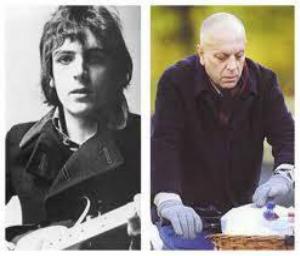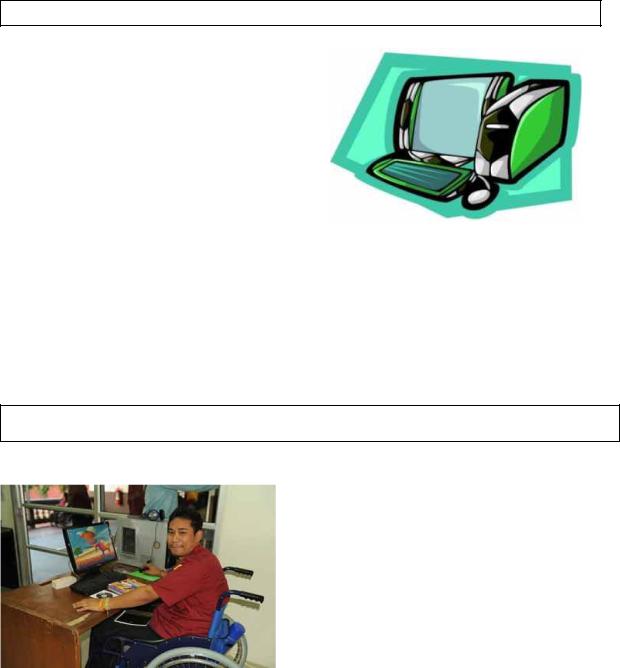
voronina_ev_sotsialnokulturnaia_sfera_obshcheniia
.pdf
Tourist Information
Tourist 1_____. I’d like information about museums in London, 2_____ . Guide There are three hundred museums in London, you know! What do you want to
see?
Tourist Well, I’m 3_____science. Guide Ok, you can go to the Science
Museum. That’s a 4_____ . There are really interesting things to see.
Tourist Right. And when is it 5____?
Guide From ten in the morning until six in the evening. On Sundays, it opens at eleven and closes at eight.
Tourist How much are the 6_____ ? Guide Entrance is free!
Tourist That’s great! And 7_____do I get there?
Guide Well, you can get a bus or the tube. The tube station for the museum is South Kensington.
Tourist Where can I get a map? I don’t want to get lost.
Guide Here you are.
Tourist 8_____ .
Guide Not at all!
5.b Underline the phrases with the verb get in the dialogue. How do you say them in your own language?
5.c Work in pairs. Take turn to be a tourist and a guide in London. Use the brochure in ex. 1.d and the dialogue in ex. 1.a to ask and give information about places in London.
5.d Work in pairs. Complete the questions (1-6) to find out about your partner’s interests in art. Interview each other and tell the class your partner’s taste in art.
1 Do you go to galleries where … ?
2 Do you have friend (who) … ?
3 Do you like pictures that … ?
4 Do you often watch programmes (which) … ?
5 Do you like artists who … ?
6 Do you buy posters which … ?
6. Extra Activities
6.a You are going to read about a famous recluse. What is a recluse? Guess, then read the information below to check your answer.
A recluse is someone who:
a)likes media attention.
b)avoids media attention.
c)comes back after a period away from media attention.
Out of sight, out of mind?
In today’s multi-media age, it seems no artist with something to sell can afford not to do interviews and chat shows to publicise their latest product. People’s interest in celebrity means we often know more about the artists than their work. Below, our reporter Wendy Finch profiles the recluse from the world of the arts who decided not to play the media game. Why are we fascinated by the artists themselves when really their work should speak for them?
41

6.b Read more about one recluse and answer the questions.
1 How is the person’s character described in the article?
2 What is his most famous piece of work?
3 What did he do later in life?
4 How was his relationship with media?
5 Is there anything surprising in the article?
SYD BARRETT (1946-2006)
At the Pink Floyd reunion in London’s Hyde Park for Live8, there was one member missing.
Often called an eccentric genius, Syd Barrett formed the supergoup Pink Floyd in 1965 and wrote, sang and played guitar on all their early hit records, including the 1967 masterpiece Piper at the Gates Dawn. He left the band in 1968 after experiencing some kind of breakdown due to the pressures of stardom and touring. He made two solo albums, The Madcap Laughs and Barrett, both released in 1970, which continue to sell well.
Barrett then left the music business completely, deciding a musician’s life was not for him. He did not make any music at all after 1974. Once a household name, he is now more or less forgotten except by his fans. He moved back to his home town of Cambridge and started to use his original name of Roger Barrett.
He lived alone, quietly spending his time painting and gardening. He received a six-figure income from his Pink Floyd royalties, but his contact with the outside world was minimal. Although he hadn’t appeared or spoken in public since the mid1970s, fans and journalists still attempted to contact him.
In 1971 a journalist tracked him down. Syd told the reporter that he walked a lot, painted, wasted time and feared getting old. He also said that he felt full of dust and guitars. Another journalist reported that a bald, fat man answered the door and said that Syd couldn’t talk. In 1992, Atlantic Records offered half a million dollars for any new Syd Barrett recordings.
His family reported that he was content and reasonably healthy. More recently, when fans or journalists called on him he was polite and coherent, but unwilling to discuss his past as a famous rock star. Talking to one journalist on his doorstep in 2001, Syd asked him to leave as he didn’t do interviews any more.
42

6.c Find words or phrases in the text that mean the following.
aa very successful record or CD
ba great work of art
ca very well-known person
dpayments made to writer of a book, song, etc.
eto issue (a record, film, book, etc.) for sale or circulation
fthe fame and prestige of being a star in films, sport, etc.
ga person or thing that is very well known.
6.d In groups, discuss the following.
1What is so special about the person in this profile? Why can this profile be interesting?
2Do you think celebrities have the right to a private life?
3Which books, songs and films do you think are masterpieces?
4What rumours about media celebrities have you heard recently?
7. Writing: Project Work
7.a Get ready to give a two minute Power Point presentation about a famous recluse painter, singer, sculptor, etc.
Find some information about this person on the Internet or in magazines, books
Process and structure the information using the Power Point software
In your presentation, include visual aids together with the information about the person’s early life, later life
Present your findings to the class
43

Unit 4
The Age of Technology
In this module you will:
Read about computers for the disabled
Talk about invention of a computerised machine
Test your project-making skills
Practise using the future tense
Listen to people talking about how they use computers
Write a letter of complaint
Learn how to use the Web
Useful vocabulary:
Nouns |
technology, entertainment, network, icon, laptop, the disabled, |
Verbs |
bookmark, browser, favourites, link |
to fit, to upgrade, to connect, to operate, to click on, to download |
|
Adjectives |
interactive, virtual, wireless, computerised |
Linkers |
firstly, secondly, finally |
Phrases and |
Global Positioning System, touchscreen monitor, computer |
collocations |
addiction, cell phone, search engine, to chat online, to send emails |
44

1. Lead-in
1.a People who have grown up with PCs and microchips are often called the digital generation. Read what some people answered when questioned about the use of computers in their lives.
Computers: friend …
↓
‘I have a GPS, Global Positioning System, fitted in my car. With this navigation system I never get lost. And the DVD recorder is perfect for my children’s entertainment.’
‘I use an interactive whiteboard, like a large touchscreen monitor, at school. I find computers very useful in education.’
‘Assistive technology, for people with disabilities, has helped me a lot. I can hardly see, so I use a screen reader, a program that reads aloud onscreen text, menus and icons.’
‘This new HMD, head-mounted display, allows me to watch films, and enjoy virtual reality, the artificial environment of the latest video games.’
‘The upgraded wireless network at my university is great: we can connect our laptops, PDAs and Wi-Fi cell phones to the network anywhere in the campus. Communication is becoming easier and easier.’
or foe?
↓
‘Our society has developed technological dependence. When computers are down, our way of life breaks down: planes stop flying, telephones don’t work, banks have to close.’
‘Computers produce electronic waste, plastic cases and microchips that are not biodegradable and have to be recycled or just thrown away.’
‘They are responsible for health problems, e.g. computer addiction, an inappropriate and excessive use of computers.’
‘Cybercrime, crime committed with the help of computers, is creating serious problems.’
‘Citizens may feel a loss of privacy because of unauthorized use of personal data or receiving unwanted electronic messages.’
1.b Make a list of the ways your family uses computers at work and in your free time. Can you think of any problems that using computers might cause?
45

2. Listening
2.a Listen to these people talking about how they use computers at work and write each speaker’s job in the table.
composer secretary
Speaker |
Job |
What they use computers for |
1 |
|
|
2 |
|
|
3 |
|
|
4 |
|
|
2.b Listen again and write what each speaker uses their computer for.
3. Reading
Pre-reading activities
3.a Work in pairs to answer the following questions:
1 What sort of difficulties do you think are experienced by computer users with limitations of vision or mobility?
2 What type of devices could be helpful to disabled users?
While-reading activities
3.b Match the FAQs (A-F) with the answers (1-6).
AHow can a blind person see a computer screen?
BHow can disabled people or very ill children make friends?
CWhat does a Picasso painting sound like?
DHow can you communicate with no words?
EHow can you use a computer with your mind?
FHow can disabled people become more independent?
46
Computers for the disabled
Can you hear or feel pictures? Can you move something without touching it? Dan Jellinek went to Los Angeles and found out that you can do all these things…and more.
Computers have started to change the lives of some disabled people. They can help them to communicate and to live more independently. The 14th international conference on computers and disabled people showed some exciting examples.
1.______________.
vOICe is a program that changes pictures into sounds. Different colours and shapes have different sounds. With practice, blind people can listen to the sounds and ‘see’ them by using their ears.
2.______________.
The program MouseCAT changes pictures into vibrations on the screen. Blind people can touch the screen and ‘feel’ the images. They can also use this program to speak – they write words and the computer says them.
3.______________.
Mindmouse can identify brain activity. It is like a hat. You put it around your head and operate the computer by thinking.
4.______________.
CharM is a computer system that can identify people’s emotions. In this way, people who can’t speak can communicate how they feel to other people. 5.______________.
Handy 1 is a robot arm with five different kinds of movement. It can help very disabled people do activities like eating and drinking.
6._______________.
It is often difficult for them to meet other children. DO-IT is an Internet program that helps them get help and support from other children who suffer the same problems.
Post-reading activities
3.c Read the article again. Write three ways computers can help disabled people. Example: Computers can help blind people to ‘see’ using…
3.d Work in groups and choose the most useful invention. Give your grounds.
_______________________________________________________________
_______________________________________________________________
_______________________________________________________________
_______________________________________________________________
_______________________________________________________________
47

Future forms
Future with will/won’t
To describe a decision made at the moment of speaking, often to make an offer.
I’ll help you with the books.
To talk about actions that will inevitably happen.
Next month I will be 23.
To talk about hopes, promises, fears, etc. especially with ‘expect’, ‘think’, ‘hope’, probably’, etc.
Electronic money will probably be more secure.
To make predictions when you don’t have ‘present evidence’.
People will vote in elections online.
Present Continuous
To describe fixed plans or arrangements (with a future time expression).
She is meeting the manager at 12.
Be going to + verb
To describe future intentions (not as definite as firm plans).
The company is going to open a new office in Rome.
To make predictions when you have ‘present evidence’ that
something is going to happen.
Look at the clouds; it’s going to rain.
Present Simple
To describe timetabled events, programmes, etc.
The plane leaves at 9.30.
4.a Revise the future form in the box. Then choose the correct answer.
1.I promise
a)I’ll buy you a 3G mobile phone.
b)I’m going to buy you a 3G mobile phone.
c)I’m buying you a 3G mobile phone.
2.A: Would you like to come to my party tomorrow?
B:I’m afraid, I can’t
a)I’ll meet Bob at the airport.
b)I’m meeting Bob at the airport.
c)I meet Bob at the airport.
3.In the near future Pcs
a)communicate with other devices without cables.
b)are going to communicate with other devices without cables.
c)will communicate with other devices without cables.
4.A: My laptop has crashed! B: Don’t worry!
a)I’m lending you mine.
48

b)I’ll lend you mine.
c)I’m going to lend you mine.
4.b Complete this conversation using the correct verb form.
Jorge: I hear you’re going on holiday next week. Carmen: Yes, we 1(go)_____to Paris. I can’t wait.
Jorge: I think you 2(love)_____Paris. How 3(you travel)_____? Carmen: Well, first we 4(fly)_____from Madrid and we 5(stay)_____in
Paris for five days.
Jorge: That sounds great! Are you going to any theme parks near Paris? Carmen: Yes, actually, we 6(visit)_____EuroDisney. After that, we are going to the south of France. We probably 7(stop)_____at
Futuroscope, near Poitiers. It’s a theme park based on new technologies, virtual reality, 3D images, …
Jorge: How lovely! When are you coming back home? Carmen: Well, I don’t know. I have a month’s holiday, so I hope we
Just 8(relax)_____by the sea for a few days and then …
4.c Write your own predictions about these topics.
1 Space tourism
e.g. There will be sightseeing trips to the Moon.
Yours:
2 The Internet
e.g. Everyone will have instant access to the Internet.
Yours:
3 Health and genetics
e.g. Electronic chips will be implanted inside our bodies to detect possible illnesses.
Yours:
4 Intelligent homes
e.g. Robots will do the house work for us. Yours:
5 Money/Holidays
e.g. Cash will disappear.
Yours:
Other future forms
Future Continuous (will be + present participle)
To talk about actions in progress at a stated future time.
This time next Saturday I’ll be skiing.
Future Perfect Simple (will have + past participle)
To talk about actions finished at a stated future time.
By the end of June I will have finished my exams.
49

Future Perfect Continuous (will have been + present participle)
To emphasize ‘how long’
By February I will have been working here for three years
4.d Look at the other future forms in the box. Translate these sentences into Russian.
1 Please don’t call tonight. I’ll be taking part in a videoconference. 2 He says he won’t have finished the report by Monday.
3 The technician will have repaired the computer by Friday. 4 Some day, we’ll be talking to our PC naturally, like a friend. 5 Next June she’ll have been teaching for 30 years.
6 In a few years’ time students will be using handheld and wearable computers in class.
4.e Expand these sentences using the Future Perfect Simple tense.
1 In ten years’ time/a lot of people/connect their television to the telephone line
2 Portable PCs/replace/desktop PCs/in a few years’ time
3 With the help of computers/doctors/find/cure/AIDS and cancer/by the year 2010
4 By this time next year/software manufactures/make/hundreds of new programs
5 By 2020/post offices and bookshops/disappear
6 By this time next year/I/buy/handheld computer
7 By the year 2030/robots/replace/human labour in industry
5. Speaking
5.a Think of a computerized machine you would like to invent. You may choose one of the machines below:
computerized fridge computerized car domestic robot computerized house
5.b Draw a picture of your machine and write notes to explain how it works.
Example: computerized fridge
What it does: speaks to you, phones shops to order more milk, eggs, etc. Advantages: more convenient, less work, etc.
How it works: you tell the fridge what you want, etc.
50
